DEH Webinar: “Theory and Practice in Applied Linguistics and TESOL: Future Directions”
The Department of English and Humanities (DEH) at the University of Liberal Arts Bangladesh (ULAB) arranged a webinar on “Theory and Practice in Applied Linguistics and TESOL: Future Directions,” on May 29, 2021, featuring Prof. Shaila Sultana, Advisor, Center for Language Studies and Adjunct Faculty, DEH, and Dr. Syeda Farzana Sultana, Assistant Professor, DEH, ULAB.
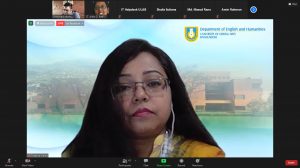 Dr. Syeda Farzana Sultana began her presentation on “Online Teacher Identity Development: What We Need to Know” with a reflection on the identity of the teacher, specifically, if there is any difference between the traditional teacher identity and online teacher identity. Teachers from various institutions shared their challenges regarding online teaching such as plagiarism, interaction, non-human interaction, assessment difficulties, that have been affecting their online
Dr. Syeda Farzana Sultana began her presentation on “Online Teacher Identity Development: What We Need to Know” with a reflection on the identity of the teacher, specifically, if there is any difference between the traditional teacher identity and online teacher identity. Teachers from various institutions shared their challenges regarding online teaching such as plagiarism, interaction, non-human interaction, assessment difficulties, that have been affecting their online
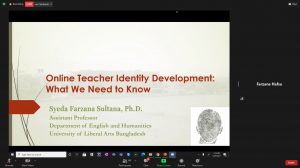 teacher identity in the current time. Dr. Sultana took these comments into account and discussed how, in the US and UK, online teaching has been practiced for long and that has helped tremendously during the pandemic. She mentioned that the teachers’ ability to cope with the changes and adapting allows for a greater modality for teachers’ identity.
teacher identity in the current time. Dr. Sultana took these comments into account and discussed how, in the US and UK, online teaching has been practiced for long and that has helped tremendously during the pandemic. She mentioned that the teachers’ ability to cope with the changes and adapting allows for a greater modality for teachers’ identity.
In this, interaction with and recognition by the self and others play a vital role. She stated that content and pedagogical knowledge are the core elements of online teaching. There is a stigma around online teaching everywhere in the world but that has the effect of turning some teachers into advocates of the system. Dr Sultana also mentioned that teachers’ identities are influenced by their own learning and professional experiences, perceptions, instructional decisions, teacher training, and so on. These can have a positive impact on teaching and these external and internal matters could complement their teaching.
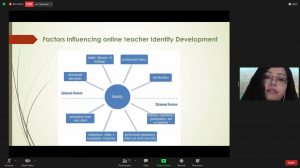
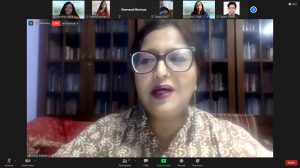 Prof. Shaila Sultana then spoke about her research itinerary from applied linguistics to sociolinguistics. She placed emphasis on teachers’ practicality, and the need to adapt to changes to better the teaching and learning environment. In her talk, she mentioned how external factors affect students’ learning in the classroom. She shared the issues in sociolinguistics in teaching and learning that remain under-researched. She also suggested how language policies could be revised so that a multilingual ecology could be maintained and languages can co-exist. It would then promote a balanced approach to language and culture rather than create segregated and marginalized settings for languages which demonstrate unrealistic practices. The silence and non-participation of the students in the online environment could perhaps be a reflection of their socioeconomic background and practices. In order to understand the interaction in classrooms, she said, we need to look into sociolinguistic backgrounds such as media, gender, business, law, religions, popular culture, linguistic landscapes, nationalism, digital discourses and spaces. They all add to various semiotic possibilities. She ended by directing young researchers to areas that need to be explored.
Prof. Shaila Sultana then spoke about her research itinerary from applied linguistics to sociolinguistics. She placed emphasis on teachers’ practicality, and the need to adapt to changes to better the teaching and learning environment. In her talk, she mentioned how external factors affect students’ learning in the classroom. She shared the issues in sociolinguistics in teaching and learning that remain under-researched. She also suggested how language policies could be revised so that a multilingual ecology could be maintained and languages can co-exist. It would then promote a balanced approach to language and culture rather than create segregated and marginalized settings for languages which demonstrate unrealistic practices. The silence and non-participation of the students in the online environment could perhaps be a reflection of their socioeconomic background and practices. In order to understand the interaction in classrooms, she said, we need to look into sociolinguistic backgrounds such as media, gender, business, law, religions, popular culture, linguistic landscapes, nationalism, digital discourses and spaces. They all add to various semiotic possibilities. She ended by directing young researchers to areas that need to be explored.
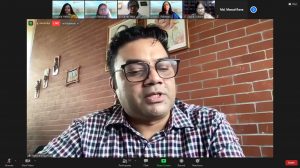 The webinar began with an introductory speech by Prof. Shamsad Mortuza, Acting Vice-Chancellor, ULAB, and Dean, School of Arts and Humanities, where he emphasized the relevance of the webinar which would focus on the importance of modified teaching strategies and renewed productive strategies.
The webinar began with an introductory speech by Prof. Shamsad Mortuza, Acting Vice-Chancellor, ULAB, and Dean, School of Arts and Humanities, where he emphasized the relevance of the webinar which would focus on the importance of modified teaching strategies and renewed productive strategies.
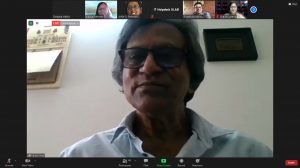 Prof. Kaiser Haq also spoke at the event which concluded with a vote of thanks by Ms. Arifa Ghani Rahman, Associate Professor and Head, DEH. The webinar was hosted by Ms. Nadia Rahman, Assistant Professor, DEH.
Prof. Kaiser Haq also spoke at the event which concluded with a vote of thanks by Ms. Arifa Ghani Rahman, Associate Professor and Head, DEH. The webinar was hosted by Ms. Nadia Rahman, Assistant Professor, DEH.
Students and teachers from schools, colleges, and universities all over Bangladesh and abroad, as well as members of BELTA, TESOL BD, CIRCLED, the English Teachers Association of Bangladesh (ETAB), and others, who attended the webinar participated enthusiastically with their questions and responses.
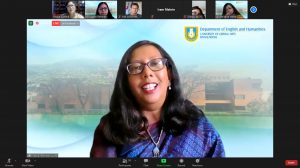
watch the full webinar.

